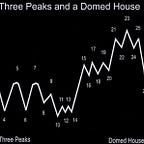Bitcoin Hates Deflation, Loves The Response To It
On a recent edition of the always spicy Tales from the Crypt podcast, Marty and Travis Kling discuss BTC within the current monetary regime. Fixed-supply assets like gold and BTC understandably outperform when currency is debased via inflation, but core CPI hasn’t hit 3% y/y in the United States since 1996. Travis is right to warn that markets should fear deflation more than inflation at this point, and that is negative for BTC.
All else equal, falling CPI puts upward pressure on real interest rates, which makes cash more attractive to hold. The $15 trillion of negative-yielding bonds has reached the financial zeitgeist, but many fail to appreciate that upwards of $25 trillion have negative real interest rates. This is a monetary environment without historical comparison, but these deflationary headwinds aren’t coming from Deutsche Bank or the BoJ, they are coming from China.
China is in the midst of its most severe economic slowdown since the Cultural Revolution. They’re battling a trade war on one front, an insurgency in Hong Kong on another, but the real existential threat for Xi & Co. is domestic unemployment — and they have few good options for stimulating the local economy. Xi and his PBoC now view their debt bonanzas, that rescued the global economy from recession in 2009 and 2016, as policy mistakes. The Chinese assumed these rescues would buy them some international goodwill, instead, all they got was blowback from Western populists. Meanwhile, the debt incurred over the past decade still hangs like an albatross over their economy, and the PBoC has effectively ruled out another re-leveraging.
What does that mean? Unless the Yuan is devalued the Chinese can expect to face enormous deflationary blowback. Since their economy is a function of state-mandate they can expect profits to decline alongside prices. And since profitability drives unemployment, it’s safe to assume that jobs are being lost — not that there are any legit/public metrics to monitor mainland employment changes. It’s not a stretch to say that China’s producer price index (mainland CPI is manipulated) has been the best leading indicator for global growth this century.
These deflationary pressure are a global issue though. China accounted for 30% of global GDP growth over the past decade, thus a slowdown in China bodes poorly for prices everywhere. Though Trump may not realize this, a trade truce will do little ameliorate these forces because technology is simultaneously exerting tremendous deflation of its own.
Let’s take Binance as an example. The real innovation at Binance is the ability to be an effective organization with a decentralized workforce. They have scale, a good product, a charismatic leader, but as an exchange, they’ll face heavy competition. Their advantage comes from utilizing skills from employees around the clock all over the world. CZ won’t give up his secrets but technology firms will inevitably copy it… the preponderance of decentralized platforms like WORK (Slack), ZM (Zoom) and PTON (Peloton) coming to market suggest it’s a matter of time.
A decentralized workforce is immensely deflationary. If you’re a founder in San Fransisco and you snag $5 million in funding that might get you 5 engineers. But if you could source competent employees from Moscow, Taipei, wherever… that could you land you 20 engineers. It’s an immensely deflationary concept that has huge implications for tech salaries, commercial real estate and consumer prices.
While the decentralized theme is out there it’s unclear whether market liquidity is sufficient to sustain valuations. The brutal IPO market, including the aforementioned WORK and PTON, combined with the downfall of WeWork suggest strange things are afoot in the private share market. The best proxy to monitor this is Softbank — ground zero for businesses that rely on free money in perpetuity to operate— where CDS protection has gotten pricey over the past month. Private shares are even an issue in China where the failure of TenCent-backed NIO shuddered markets last week.
What will it mean if Softbank stumbles and asset markets take a hit: deflation. What does deflation mean for BTC? In a vacuum it’s trouble. Falling prices = higher real rates = cash is more attractive as a safe-haven. It’s easy to forget that gold dropped -30% from March through November 2008 in the midst of the financial crisis. The reason was central banks staying behind the curve, and not pressuring real rates lower until November — nearly 3 months after the failure of Lehman Brothers. As a sign of the prescience we’re dealing with here, the ECB hiked rates in July 2008 because they were afraid of inflation! However, once central banks injected enough liquidity to stabilize markets gold rallied 175% between November 2008 and August 2011.
What gold and BTC love are policy efforts to combat deflation. Central bankers know everything about inflation, especially how to keep it contained. They know relatively little of deflation and how to manipulate it higher. You can be sure they’ll do everything in their power to try, but forecasting the how, when and whether it is sufficient to meet market expectations is tricky. Factor in what promises to be the most grotesque Presidential election in history… who knows what markets have in store for us.
All of this is to say that just because you read a headline about imminent QE or MMT doesn’t mean BTC has to rally straight away. The old saying goes: Mr Market can remain irrational longer than you can remain solvent… but that irrationality is subjective. Mr Market is dealing with global forces at all hours and his conclusions can be beyond our comprehension. The key is to have faith in BTC’s irrefutable fundamentals and what it portends when we come out the other side of this Fourth Turning. At the other end of this morass is the potential for a deflationary boom, which will be covered in our next post.
